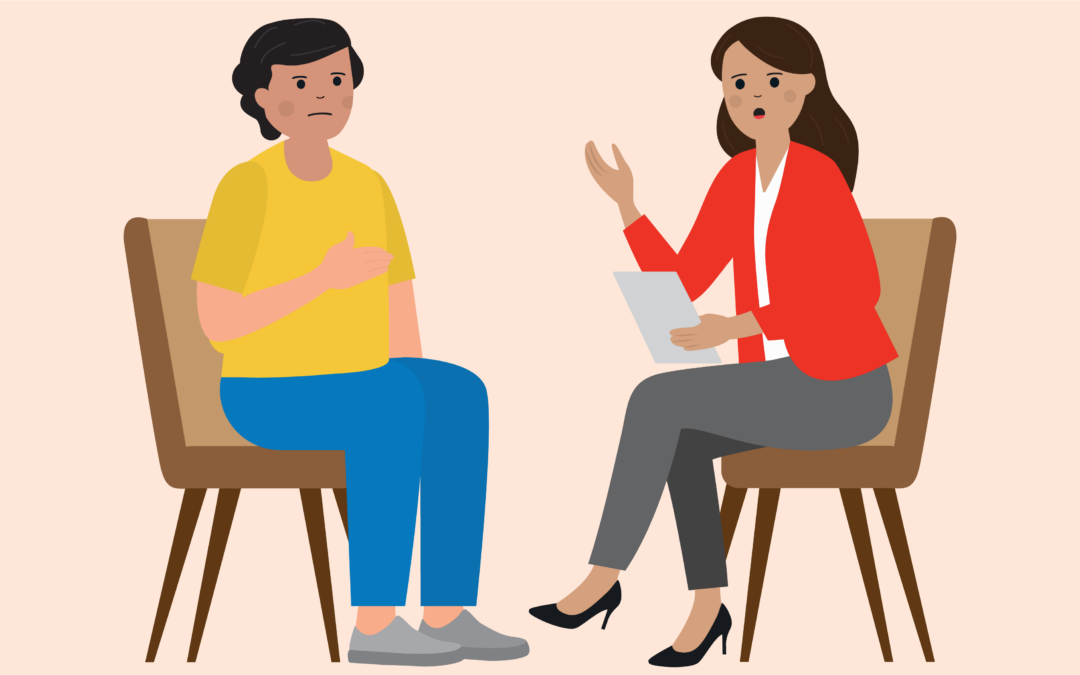When supporting someone through a mental health problem, it’s natural to want to connect through shared experiences. We might say, ‘I’ve been through something similar,’ or ‘I know exactly how that feels,’ with the best of intentions – to reassure, to show empathy and compassion, or to reduce stigma.
But while personal stories can be powerful, in Mental Health First Aid (MHFA) training, one of the core principles is to keep the focus on the person you are supporting – not on yourself. When we centre ourselves in the conversation, even unintentionally, we risk shifting attention away from the person who needs it most.
This doesn’t mean you can never share anything personal. The key is to do so in a way that supports or responds to the person’s needs.
So, when is it helpful to share, and when is it better to simply listen?
The importance of keeping the focus on the other person
In many other settings, sharing stories and experiences can help build connections. But MHFA course guidance to keep the focus on the person you are supporting is about ensuring that the person in distress feels heard and supported in the moment.
- It keeps the conversation focused on their needs. When someone is struggling, they need space to talk without feeling obliged to respond to someone else’s experiences.
- It avoids comparison. No two mental health experiences are identical. Even if there are similarities, a well-meaning ‘I know exactly how you feel’ can never be entirely true – and may come across as dismissive.
- It keeps boundaries intact. When supporting someone, it’s important to remember that the conversation is about them, not you. Your role is to provide a listening ear, not to compare experiences.
- It recognises individual differences. Mental health experiences are deeply personal. Even if you’ve been through something similar, it doesn’t mean your perspective will resonate.
In these sensitive moments, it’s important that the person we’re supporting feels heard and understood without the pressure of needing to reciprocate or reassure us.
When sharing personal experiences can be helpful
While the default approach should be to listen, there are moments when a small, well-placed personal insight can be helpful:
- When it builds rapport. A brief comment like, ‘I’ve struggled with stress too, and I know how overwhelming it can feel’, can help someone feel less alone.
- When it shows empathy. A simple acknowledgment, such as ‘I’ve felt that way before too’, can validate their experience without taking over the conversation.
- When it encourages openness. For people hesitant to talk, hearing a small part of someone else’s experience can make it easier for them to share. A shared experience might act as a prompt, signalling that it’s okay to be vulnerable.
How to share without shifting the focus
This doesn’t mean you should never share anything. Brief, intentional self-disclosure – used carefully – can help someone feel less alone. But it should always be guided by the person’s needs, not our own impulse to relate.
- Keep it brief and relevant. A short, simple statement like ‘I’ve felt that way too sometimes’, is often enough. Avoid telling long personal stories that could take attention away from the person in need.
- Stay emotionally neutral. If sharing makes you visibly upset, the person might feel pressured to comfort you instead of focusing on their own feelings. Your experience should provide a sense of solidarity, not sympathy.
- Redirect the focus: After sharing a brief personal connection, guide the conversation back to the person. For example, ‘But I’d like to hear more about how you’re feeling’.
What to avoid when you do share
While your intent may be to help, there are some things to avoid ensuring the conversation remains supportive and focused.
- Avoid making it about you. The conversation must centre on the person in need. Your experience should never overshadow their emotions or detract from their needs.
- Avoid long, personal stories. The more you talk about yourself, the less space you’re leaving for the person to express themselves. Even if your story feels relevant, this is about giving them the tools to process their own emotions.
- Avoid minimising or comparing. Even if you’ve had similar experiences, it’s crucial to avoid statements like ‘I went through the same’ or ‘I know exactly how you feel’. Every person’s experience is unique.
- Avoid assuming your way of coping is also theirs. Your way of coping may not be the same as theirs. Instead of saying, ‘You should try what I did,’ ask, ‘What do you think might help you right now?’
Finding the balance
The balance between maintaining focus on the person in need and offering your own experiences as a source of connection is delicate. The key is to always be mindful of the goal of the conversation: to listen, validate, and empower, not to compare or overshadow.
As MHFAiders, we know that the power of words in mental health conversations lies not just in the stories we tell, but in the way we listen. By listening first and holding space for their experiences, we let them know that their feelings are valid and that they are not alone.
‘When someone shares a story with me, I make a conscious effort to avoid responding with “oh, something similar happened to me” – and instead ask them a follow-up question like “how are you feeling about that?”
I’ve been surprised by how many times this simple question has encouraged people to open up about deeper issues beyond their initial story, which I’m hoping will lead to stronger relationships and greater trust.’
Katherine, MHFAider



